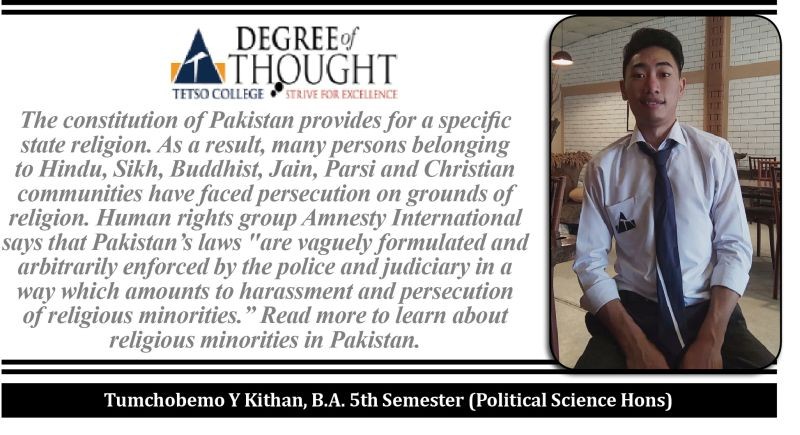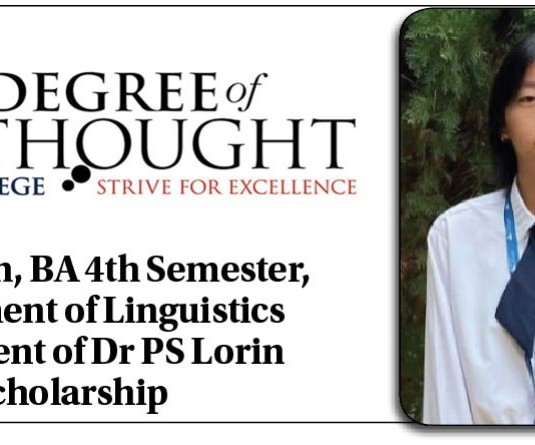
"Since 1990, 70 people have been killed for blasphemy and 40 people are currently serving life sentences and on death row. Religious persecution remains a silent feature of Pakistan. Hindus, Christians, Ahmedias and Hazara are helpless victims at the hands of religious extremists who operate with the government impunity." ~ Fatima Gul, Pakistani-American Human Rights Activist
The state religion in Pakistan is Islam and it is practiced by 96% of the population. The remaining population is the religious minority consisting of Hindu, Christian, Ahmadis, etc. Despite laying down rights and freedom of all the citizens of Pakistan the human rights of religious minorities in Pakistan face a major issue in the current day. They are not only discriminated and excluded but are also prone to violence and misuse of blasphemy laws (example- Asia Bibi case). There have been numerous incidents of destruction of churches and temples. Pakistani minorities consist of Ahmadis, Bahais, Buddhists, Christians, Hindus, Jains, Kalasha (of Chitral), Parsis and Sikhs.
Religious discrimination in Pakistan is a serious issue for the human rights situation in modern-day Pakistan. Religious minorities often face discrimination and at times are even subjected to violence. The Human Rights Commission of Pakistan (HRCP) stated that religious minorities in Pakistan such as the Hindu and Christian communities continued to undergo forced conversion and persecution under blasphemy laws. The religious minorities were also unable to enjoy the freedom of religion which was granted to them by the constitution. There have been numerous cases where the people of the religious minorities are abducted, forced conversion, persecution, etc. from all, churches, temples and other places of worship are burned down by the religious extremists that portrayed how the members of religious minority communities are unsafe.
The Human rights of religious minorities are in a debilitated state and seriously requires external intervention to protect the rights of the minority community, as the government of Pakistan has been unsuccessful to take any efficient action against the religious extremists who have burned down churches, temples, and other non-Muslim places of worship or abductors who forcefully converts non-Muslim girls to Islam. In contemporary times, forced marriages and conversions of young girls are one of the major threats to the rights of religious minorities. The legal system has also failed to take any stringent steps to resolve the ensuing events.
Pakistan was established on the beliefs of Islam. Much of the community in Pakistan was Muslim and non-Muslim minorities were also present in Pakistan. Freedom of religion is granted by the constitution, which enacted a fundamental right of Pakistani citizens, regardless of their religion. The Constitution of Pakistan, in article 25 (1), guarantees that “all citizens are equal before the law and are entitled to equal protection of the law.” Article 5 provides that “adequate provision shall be made for the minorities to freely profess and practice their religions and develop their cultures,” and article 33 declares that it is the State’s accountability to restrain parochial, racial, tribal, sectarian, and provincial prejudices among citizens. However, these objectives have never been completely put into practice, and are contravened by other provisions of the Constitution. Even article 20 of the Constitution, that regard every citizen’s “right to profess, practice and propagate his religion” and that “every religious denomination and every sect thereof shall have the right to establish, maintain and manage its religious institutions”, is “subject to law, public order and morality,” and is thus conflicted in law and practice when it comes to the rights of religious minorities in Pakistan.
In October 2019, the Provincial Assembly of Sindh rejected a bill criminalizing forced religious conversions. The bill was presented to the whole legislative body to outlaw forced conversion and marriage of minors. The bill stated that any individual convicted of forced conversion would have to serve a sentence of five years in prison. Furthermore, in the case of minors, the bill stated that no individual would be compelled to change their religion until they attain the age of eighteen. Another leader of Jamaat-e-Islami, Advocated Asadullah Bhutto raised several questions on the bill and stated it not only opposes the constitution of Pakistan but also the basic principles of Islam.
The rejection of the bill, which played a crucial role in protecting the rights and freedom of religious minorities and shows the Pakistan Government’s blatant disregard for the basic human rights of the minorities. The aim of this bill was to defend women and parts of religious minority communities, to protect their rights but it is the disapproval of the bill that has threatened the lives of the minority communities.
Considering the continuing exploitation of human rights in Pakistan, the Rights group has disclosed how the minority communities in the country are constantly under restriction, and religious minorities are regarded as “non-citizens”, without a voice and any legitimately protected rights. The Centre for Democracy, Pluralism and Human Rights (CDPHR), in its account, addressed that, “Minorities in the Islamic Republic of Pakistan are forced to lead lives which are perpetually under siege. Minorities and their families are terrorized, subjugated and converted through this draconian law”. “further mentioned that though Pakistan is a signatory to several international human rights treaties such as the International Covenant on Civil and Political Rights (ICCPR), records that, the place in which religious and ethnic minorities lives is tarnished by hate speech, acrimony and recurrent appeal of irreverent laws”. ‘These hardships have made it more crucial for people of religious and ethnic minorities to live harmlessly and completely exert their rights to freedom of opinion and belief’ Furthermore, it is generally conceived that the Human Rights movement in Pakistan is a "toothless movement" and rights organizations of Pakistan remain on paper only.
The Pakistani authorities have failed to ensure equality, dignity, rule of law and the protection of human rights of all Pakistanis, and thus rendered themselves responsible for serious violations of international human rights law, including the two International Covenants on Civil and Political Rights and on Economic Social and Cultural Rights, as well as the Convention on the Elimination of Racial Discrimination, the Convention on the Rights of the Child, and the Convention on the Elimination of Discrimination Against Women.
As a student of Human Rights, I have been observing the Human Rights situation in South East Asia. To my shock and surprise, Pakistan has proven yet again as a failed political state which could not protect the rights of its religious minorities. There have been cases that Christians, Hindus and other minorities are compelled to leave the country to escape from deadly, state-sponsored religious persecution. I urge the international community to pay attention to the factual situation of religious minorities in Pakistan in the interest of Universal Justice and Peace.
Degree of Thought is a weekly community column initiated by Tetso College in partnership with The Morung Express. Degree of Thought will delve into the social, cultural, political and educational issues around us. The views expressed here do not reflect the opinion of the institution. Tetso College is a NAAC Accredited UGC recognised Commerce and Arts College. The editors are Dr Hewasa Lorin, Dr Aniruddha Babar, Aienla A, Meren and Kvulo Lorin. For feedback or comments please email: dot@tetsocollege.org






